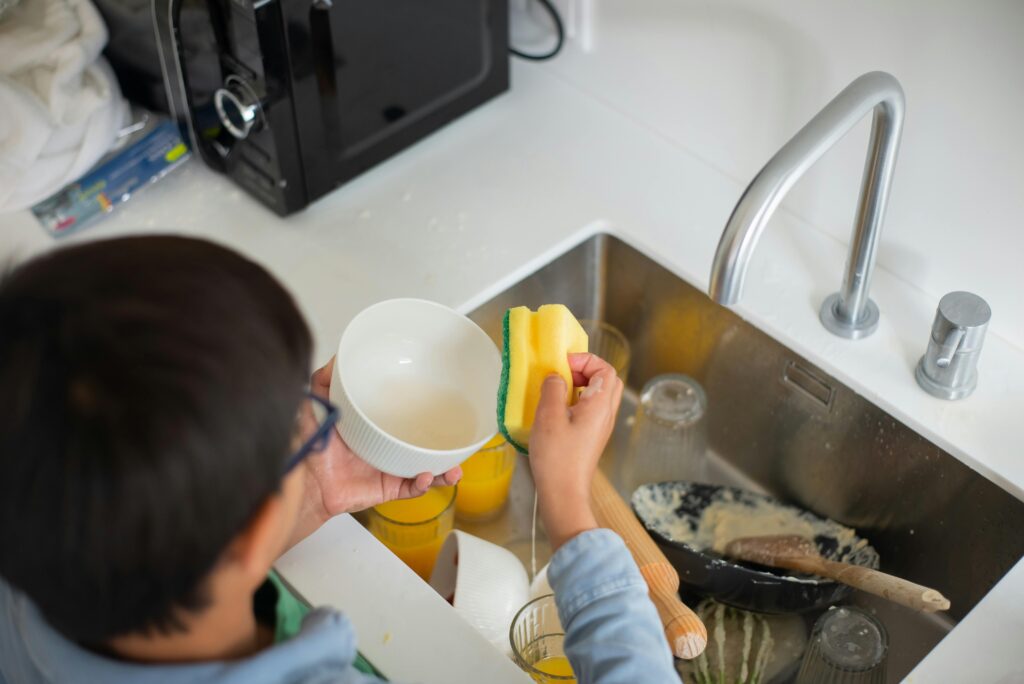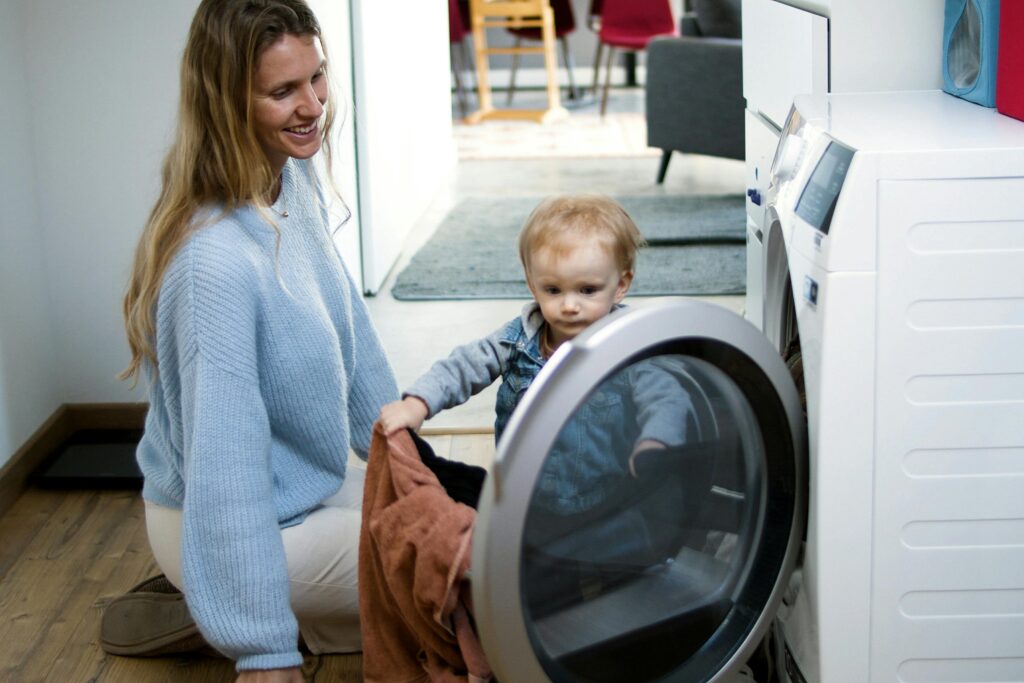Kids Who Do Chores Are More Likely to Be Successful Later in Life, Study Finds

Imagine your child as a seed. You water them with love, nourish them with opportunity, and shield them from storms. But what if one of the most powerful nutrients for their future success is something as humble as taking out the trash or setting the dinner table?
It may sound simple, even old-fashioned, but science tells a powerful truth: chores are one of the strongest predictors of lifelong success. According to the renowned Harvard Grant Study, which has followed participants for over 85 years, the foundation of a fulfilling life rests on two pillars – love and work ethic. And when it comes to building that ethic, few tools are as effective, accessible, or overlooked as household chores.
Surprisingly, while 82% of today’s parents grew up doing chores, only 28% assign them regularly to their own kids. In a world obsessed with achievement test scores, trophies, extracurricular overload we often forget that real success is built not in the spotlight, but in the quiet consistency of contribution.
This isn’t about scrubbing floors for praise or trading dishwashing for dessert. It’s about raising children who know how to show up, pitch in, and take ownership not just of tasks, but of their own lives.
So what exactly do chores teach? And why do they matter so much for the adults our children are becoming?
Why Chores Matter
On the surface, chores may seem like a simple way to keep the household running. But beneath the surface, they serve a much deeper purpose: they are a powerful developmental tool that shapes identity, builds character, and nurtures the mindset children carry into adulthood.
Chores help cultivate responsibility. They teach children that certain things need to be done not for a reward, but because they are necessary. This instills the belief that their effort has meaning, even when it isn’t glamorous or publicly praised. In completing everyday tasks, children begin to understand a powerful truth: “I am capable. I can contribute. I matter.”
Research from the Harvard Grant Study reinforces this. It found that those who grew up doing chores were more likely to succeed in their careers, maintain healthy relationships, and demonstrate emotional resilience. Why? Because they had been taught from an early age how to be part of something bigger than themselves. They learned to value contribution over entitlement.

There’s also a strong link between chores and self-worth. A child who helps cook dinner or clean the family room isn’t just performing a task they’re seeing the tangible impact of their effort. That sense of agency becomes a cornerstone for confidence and intrinsic motivation. They’re no longer passive participants in their environment they are shaping it.
Chores also create a natural space for teaching empathy and teamwork. When children understand that their actions make life easier for others, they develop a broader awareness of the world outside themselves. They start to see that every member of a family, team, or community has a role and that every role matters.
Even emotional and cognitive benefits are tied to chores. Studies have shown that kids who do chores demonstrate stronger executive function the mental skills needed to plan, focus attention, and juggle multiple tasks successfully. These are the very same skills that drive academic performance, career achievement, and personal growth.
The Research Behind the Message

The power of chores isn’t just common sense it’s science. Multiple long-term studies confirm that children who grow up doing regular household tasks are more likely to become capable, successful, and emotionally grounded adults. The data is clear: chores are not a distraction from development they are a foundation for it.
One of the most compelling pieces of evidence comes from the Harvard Grant Study, the longest-running longitudinal study in history, spanning over 85 years. This groundbreaking research identified two major factors linked to lifelong success and happiness: a strong work ethic and close relationships. Chores, it turns out, directly build the former and support the latter.
Through shared responsibilities, children develop a sense of accountability, a recognition that their actions impact others. When a child helps set the table or cleans up after a meal, they aren’t just completing a task; they’re learning to see their role in the family system. This sense of contribution fosters empathy, collaboration, and a mindset of service, all of which are crucial in personal and professional life.
A 20-year study by the University of Minnesota reinforces this finding. It concluded that children who began doing chores as young as age three were more likely to grow into adults with stable careers, higher academic achievement, and stronger relationships. The key wasn’t just what chores they did but the fact that they learned early on to do what needed to be done, regardless of whether it was fun or rewarded.
Educator and author Julie Lythcott-Haims warns that over-parenting doing too much for our kids actually stunts their growth. When children are shielded from responsibility, they miss the chance to build self-efficacy, the belief in their own ability to manage life’s challenges. Chores act as daily opportunities to strengthen this belief, one small task at a time.
Scientific research also connects chores to improved executive functioning the cognitive abilities that help kids focus, plan, manage time, and follow through. A study published in the Australian Occupational Therapy Journal found that children who consistently did chores performed better academically and demonstrated stronger problem-solving skills.
Incorporating chores into a child’s routine isn’t about discipline or control. It’s about wiring the brain for independence, strengthening emotional intelligence, and preparing them for the real-world responsibilities they’ll one day face at work, in relationships, and within society at large.
Why Chores Often Fall Off the Radar

Despite overwhelming research confirming their value, chores are quietly disappearing from many homes. A survey by Braun Research revealed a stark contrast: while 82% of parents grew up doing chores, only 28% assign them regularly to their children today. This gap isn’t caused by laziness it’s rooted in the complexity of modern parenting.
Today’s families are juggling more than ever. Between school pickups, extracurricular schedules, dinner prep, and screen-time battles, asking a child to fold laundry can feel like adding fuel to the fire. In the chaos of daily life, it’s often easier for parents to do the task themselves than to battle resistance, explain the steps, and endure the inevitable pushback.
There’s also the subtle fear of missing out on more “important” things. In a culture obsessed with academic performance and curated achievements, many parents worry that chores might take time away from tutoring, piano lessons, or competitive sports activities that seem more impressive on college applications or social media.
But this prioritization comes at a cost. By focusing only on resume-building skills, we risk neglecting the foundational traits that determine long-term success: grit, initiative, cooperation, and resilience. These are precisely the traits that daily responsibilities help develop not in a classroom, but in the kitchen, garden, or laundry room.
Overparenting plays a role too. Many well-meaning parents over-function on their children’s behalf packing their bags, making their beds, cleaning up their messes all in an attempt to protect or perfect. But as Julie Lythcott-Haims explains, this approach sends an unintended message: “You can’t handle life without me.” In doing so, we rob kids of the chance to build confidence through competence.
There’s also the very human element of fatigue. After a long day, many parents just want peace not another battle over who will take the trash out. When time is short and stress is high, chores fall low on the priority list. And understandably so. But the long-term cost of skipping them isn’t just a messy house it’s a missed opportunity for growth.
Chores aren’t just tasks to be done they’re lessons waiting to be taught. But in today’s fast-paced world, teaching takes time. And that’s the modern dilemma: we know chores matter, but carving out space for them amidst everything else feels nearly impossible.
Practical, Connection-Based Strategies That Actually Help

Knowing that chores matter is one thing. Getting kids to actually do them consistently and without a daily battle is something else entirely. But it’s not about yelling louder or bribing bigger. It’s about shifting the approach from control to connection, from command to collaboration.
Start with connection, not correction.
Children are far more cooperative when they feel emotionally seen. Before giving instructions, take a moment to engage make eye contact, share a smile, use a playful tone. A child deeply immersed in play isn’t being “defiant” when they ignore your request; they’re simply in a different mental space. Bridging that gap with empathy softens resistance. “I see you’re having fun with your blocks. When you’re ready, I need your help with setting the table.” It’s simple, but powerful.
Break tasks down and narrate what you see.
Kids don’t always see messes the way adults do. What looks like laziness is often just underdeveloped awareness. Narrating the environment “I see wrappers on the floor and crayons without lids” helps children learn to scan and respond. Then, offer shared action: “You do the crayons while I grab the wrappers.” When you model teamwork, you invite participation rather than demand it.
Use visual cues and simple checklists.
Children respond well to visual structure. Create a basic routine chart with drawings or symbols for younger kids make bed, brush teeth, put toys away. Let them check off tasks as they go. For older children, short written lists can reduce overwhelm and give them a sense of ownership. Think of it as scaffolding, not micro-managing.

Support first, then step back.
Chores should match developmental ability. If a task feels too big, break it into manageable parts and do it alongside your child until confidence builds. Support doesn’t mean doing it for them it means helping them do it with you until they can do it alone. Progress matters more than perfection.
Keep the tone light, and make it fun where you can.
Play is a child’s language. Turn yard cleanup into a competition. Make dishwashing a sing-along. Announce a “10-minute tidy-up challenge” with music. When chores feel like punishment, kids resist. But when they feel like participation in a shared mission, resistance drops and cooperation rises.
Skip the sticker charts build the mindset.
While rewards can work short-term, research shows they don’t sustain intrinsic motivation over time. What lasts is the sense that their help matters that they are part of a team. When a child feels needed, they step up. Gratitude and verbal recognition go further than any toy or treat.
Chores are not just tasks to complete; they’re moments to connect, teach, and empower. With patience, consistency, and compassion, even the most reluctant child can come to see chores not as a burden—but as their way of belonging.
Raising Capable, Compassionate Humans
Chores may start with sweeping a floor or folding a towel, but their impact goes far beyond household tasks. When we ask children to participate in the daily rhythm of family life, we’re not just teaching them how to clean—we’re teaching them how to live.
Each chore completed helps a child internalize a vital truth: they are not just passengers in life they are contributors. This sense of contribution builds confidence not rooted in praise or achievement, but in purpose. A child who knows their effort matters begins to carry that mindset into every space they enter school, work, friendships, community.
Chores also dismantle the illusion of self-centeredness. When a child clears the table or helps with laundry, they begin to see that others rely on them. That realization builds empathy, the understanding that life is shared and that their actions affect those around them. These small, quiet acts of service form the emotional backbone of strong relationships and functional teams.
In a world that often glorifies external success, we must remember that real success is rooted in character. It’s not just about who gets the highest grades or the best job it’s about who shows up, takes responsibility, and lifts others along the way. Chores prepare children for that kind of success. They foster grit, humility, patience, and emotional resilience the traits that shape not just high-achieving adults, but good human beings.
Assigning chores is not about making life harder for kids. It’s about preparing them for a life where they know how to care for themselves and for others. It’s about giving them the tools to thrive when things don’t come easy, when no one’s watching, and when showing up is the most important thing they can do.
This is the invitation: raise kids who contribute. Not because we told them to, or paid them to, but because they understand the value of effort, service, and being part of something larger than themselves.
A made bed or swept floor may seem like a small thing but in the heart of a child, it’s laying the foundation for a life of capability, compassion, and quiet confidence.
Loading...

